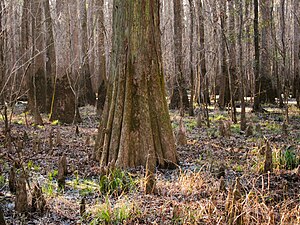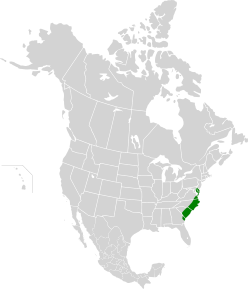Middle Atlantic Coastal Forests
| Middle Atlantic coastal forests | |
|---|---|

|
|
 |
|
| Ecology | |
| Biome | Temperate coniferous forest |
| Borders | Southeastern conifer forests, Southeastern mixed forests and Northeastern coastal forests |
| Bird species | 237 |
| Mammal species | 58 |
| Geography | |
| Area | 133,600 km2 (51,600 sq mi) |
| Country | United States |
| States | Delaware, Maryland, Virginia, North Carolina, South Carolina and Georgia |
| Conservation | |
| Habitat loss | 39.3% |
| Protected | 11.3% |
The Middle Atlantic coastal forests are a temperate coniferous forest mixed with patches of evergreen broadleaved forests (closer to the Atlantic coast) along the coast of the southeastern United States.
The Middle Atlantic coastal forests stretch along the Atlantic coast of the United States from the Delmarva Peninsula south to the Georgia coast. They cover the lower Atlantic coastal plain and are bordered on the west by the Southeastern mixed forests.
The habitats of the ecoregion are constantly modified by natural processes. The bottomlands, coastal plains, and maritime areas are vulnerable to tropical cyclones and floods. The drier areas with porous sandy soils are susceptible to fires and drought. Fire return intervals of 1 to 3 years favor herbaceous plants; longer intervals favor dense shrubs, to broadleaved evergreen trees.
This ecoregion has a humid subtropical climate with hot summers and mild winters, and with the heaviest precipitation concentrated in the warmest months.
Two basic types of forests are found in this region; 1) Southern mixed pine-oak forests that see frequent fire with sandy soils, and 2) isolated patches of evergreen broadleaved forests and "hammocks" close to the Atlantic coastline in the southernmost areas in coastal South Carolina and coastal Georgia.
The mixed pine-oak forests occur on dry or sandy soils or in areas exposed to occasional fires. Longleaf pine (Pinus palustris), superbly adapted to fire-prone environments, is the principal tree of these forests. Loblolly pine (Pinus taeda) and shortleaf pine (Pinus echinata) grow in sandy soils. On moist soils or where fires are infrequent, hardwoods overtake the pines. These hardwoods include turkey oak (Quercus laevis), post oak (Quercus stellata), myrtle oak (Quercus myrtifolia), Spanish oak (Quercus falcata), and southern catalpa (Catalpa bignonioides).
...
Wikipedia
